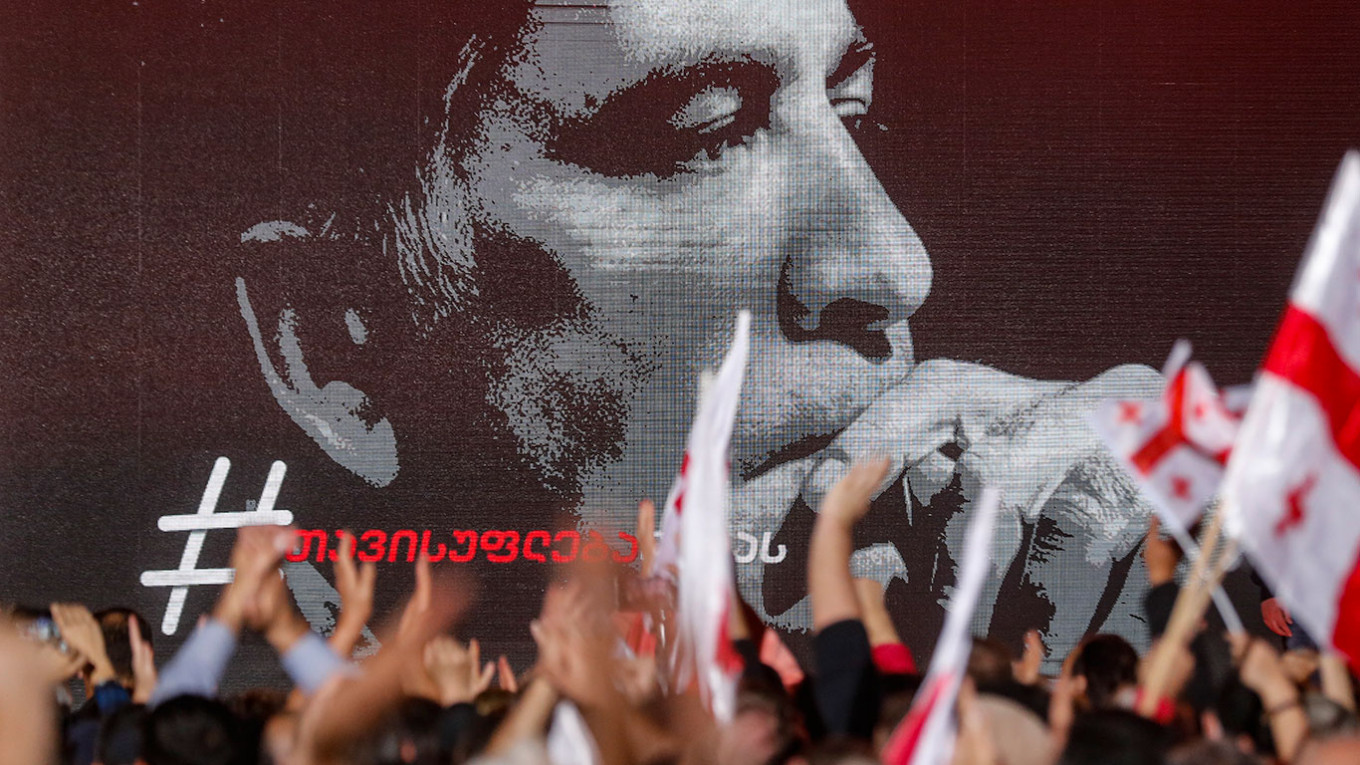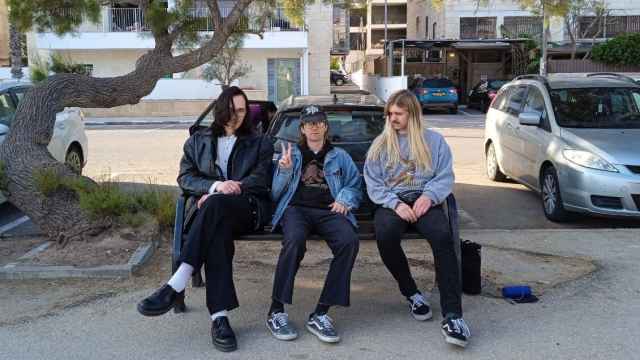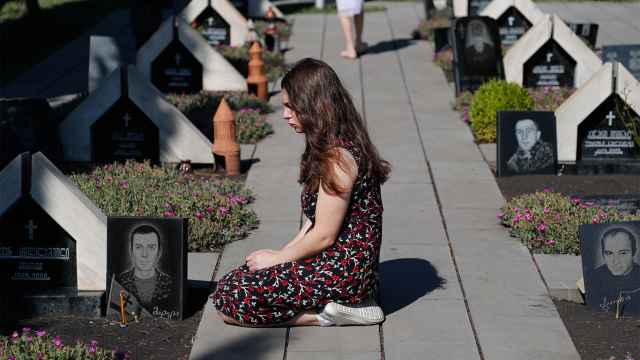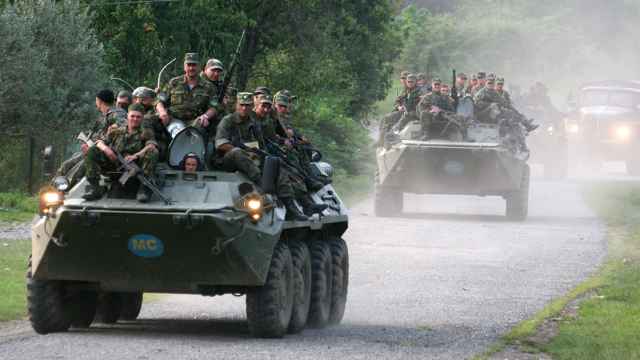The health of Georgia’s most famous prisoner, former president Mikheil Saakashvili, has deteriorated after nearly a month of a hunger strike. But the weaker he gets, the bigger problem he is becoming for the Georgian government.
Saakashvili has been refusing food for nearly a month since he was detained following his dramatic, surreptitious return to Georgia at the end of September. The resulting emaciation, combined with his chronic thalassemia – inherited hemoglobin and red cell deficiency – could result in a life-threatening crisis any day, his doctors have warned.
As Saakashvili’s health has declined, his doctors have tried to get him moved to a private clinic, arguing that the prison clinic may not be fit to provide the urgent treatment he may require.
The authorities have refused, however, arguing that the former president shouldn’t be privileged over other inmates, who get their medical treatment at prison facilities and have mocked his request. Asked about Saakashvili’s condition, Prime Minister Irakli Garibashvili – a longtime political foe – couldn’t avoid an ironic tone. “Don’t worry, we will take good care of the inmate Saakashvili,” Garibashvili said this week.
Saakashvili’s personal doctor and his supporters, however, have pointed to the fact that hundreds of Georgian inmates are routinely moved from prison hospitals to specialized clinics.
“When I was the head of the Republican Hospital [a large clinic in Tbilisi], lots of patients were brought to me from the prison hospital,” Saakashvili’s personal physician, Nikoloz Kipshidze, said on Oct. 22 after administering an IV treatment to the ex-president in his cell.
Saakashvili’s lawyers further argue that to admit him to the prison hospital, where many convicted criminals are treated, would endanger his life. Given that Saakashvili oversaw a crackdown on organized crime during his time in office, the lawyers said he is vulnerable to a revenge attack.
Ukrainian human rights ombudsman Liudmyla Denisova, who arrived in Tbilisi to check on Saakashvili on Oct. 27, also called on the government to allow him to be transferred to a private clinic. (Saakashvili is a Ukrainian citizen and has lived in the country on and off since leaving power in Georgia in 2013; he is currently an adviser to Ukrainian President Volodymyr Zelenskiy.)
“We all know that on the 27th day of hunger strike there is a risk of some organs giving out and, at that stage, the ambulance may not be able to save him and it might be too late for hospitalization,” Denisova told reporters.
Denisova also said the government appeared to be trying to thwart her visit, as she was pulled aside for extensive questioning at the Tbilisi airport before she was allowed to enter Georgia. “They only let me in after I made some calls and warned them about the implications,” she said. Saakashvili’s Ukrainian lawyer and a group of Ukrainian journalists were denied entry at the airport, an illustration of the deteriorating relations between the two allies over Saakashvili’s treatment.
Georgia’s major partners, the European Union and United States, also have been watching the situation with concern. Several members of the European Parliament who deal with Georgia recently published a harshly worded joint letter, writing that the fact “the leader of the opposition and former President is in jail, raises question[s] about [the] political nature of the persecution.”
For Georgia’s government, however, the primary preoccupation is the purported threat of Saakashvili-led civil unrest at home, a potential Rose Revolution part deux.
Garibashvili has said that Saakashvili’s real agenda is that being housed in a private clinic would make it easier for his supporters to free him. They argue that his whole purpose in returning to Georgia – sneaking into the country ahead of the first round of local elections at the end of September – was to foment a revolt.
Saakashvili, for his part, has done little to dispel that impression, repeatedly saying that he returned to oust the ruling Georgian Dream party. Anticipating an arrest upon return, Saakashvili said that “the Georgian people will free themselves and free me too” from the clutches of oligarch Bidzina Ivanishvili, the founder of the ruling Georgian Dream party and still the country’s behind-the-scenes leader.
With the second round of the elections coming up on Oct. 30, the controversy over Saakashvili has exacerbated broader political tensions, creating a fraught atmosphere that could come to a head-on election day.
Ahead of the vote the government and opposition have been rallying crowds to, respectively, condemn or support the jailed ex-president.
“Look out from your cell, Saakashvili, and see how many free Georgians are here, Georgians who remember your violent regime and who don’t want you back,” Minister of Culture and Sports Tea Tsulukiani told a rally that Georgian Dream organized in central Tbilisi on Oct. 27.
The rally appeared to be a thinly veiled attempt to outshine a large pro-Saakashvili demonstration held at the same place two weeks earlier. At both events, many participants were bused in from outside the capital in keeping with Georgia’s long-established practice of rival parties attempting to outshout and outnumber one another at campaign gatherings and then letting the media debate which side managed to gather a larger crowd.
Georgian Dream leaders made repeated reverential references to Ivanishvili at their rally, reminding voters how the billionaire freed Georgians of what they call Saakashvili’s “brutal regime” nine years ago. Saakashvili responded from jail with a statement, addressing his archfoe Ivanishvili directly: “If you had any spine, you would have brought me to this paid-for rally of yours and challenged me to a debate in front of the very people you brought there.”
This article was first published by Eurasianet.
A Message from The Moscow Times:
Dear readers,
We are facing unprecedented challenges. Russia's Prosecutor General's Office has designated The Moscow Times as an "undesirable" organization, criminalizing our work and putting our staff at risk of prosecution. This follows our earlier unjust labeling as a "foreign agent."
These actions are direct attempts to silence independent journalism in Russia. The authorities claim our work "discredits the decisions of the Russian leadership." We see things differently: we strive to provide accurate, unbiased reporting on Russia.
We, the journalists of The Moscow Times, refuse to be silenced. But to continue our work, we need your help.
Your support, no matter how small, makes a world of difference. If you can, please support us monthly starting from just $2. It's quick to set up, and every contribution makes a significant impact.
By supporting The Moscow Times, you're defending open, independent journalism in the face of repression. Thank you for standing with us.
Remind me later.






